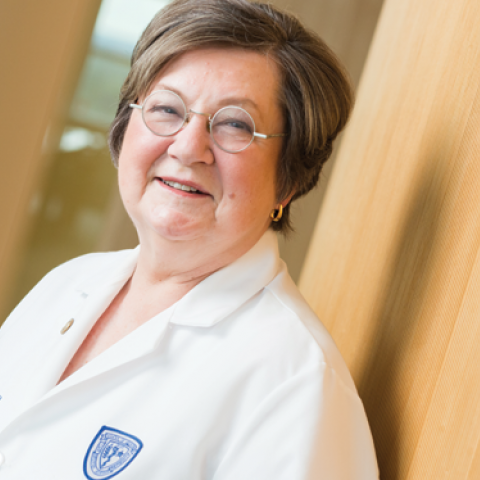This will be my last Dean’s message. I’ve spent quite a spectacular week with lots of wonderful virtual send-offs from my visiting committee, my leadership team, the development team, several groups of chairs, some of my colleagues, and the Medical Alumni Board—who invited a good many people to hear my last report and to say good-bye to me as dean.
Though some may call it that, of course, I am not retiring. There is much turmoil in biomedicine today, and I have never run in the face of trouble in my life. I am reloading and preparing to enter the fray once again. After a yearlong sabbatical, I will return to the faculty in the Center for Community Health Integration to learn from and work with Kurt Stange, Heidi Gullet, and the team on research and programs of interest. For one example, I’d like to see how the augmented reality technology in which we made such an investment can be leveraged to improve the health of our community.
And though this is my last message as dean, you can still find my past messages on this as well as my own website. Occasionally, I might augment the number! In addition, I am still writing. On sabbatical, I plan to write at least one book—on cystic fibrosis. I entered the field when affected children died young and the clinical syndrome was all we really knew. I participated in the improvements in length and quality of life of these patients with intensive but symptomatic therapies, all the while advancing our understanding of the disease. I contributed to the studies that led to drugs directed at the basic defect which changed the face of the disease for good. I know about the scientific collaborators—and the competitors. And I know the patients’ stories at every stage. This arc of research, and its human impact, is a story worth telling to the public as well as to future physicians and scientists.
And there are other things to write—papers too long “in the pen” and of course, grants. I’ve been out of the system for a few years, I might be rusty, and the parameters of grant writing have changed, but we have so many things that need support. Maybe I can help. After all, in my time at CWRU, I garnered over $200 million in external funding as a PI. I am hoping the groove comes back to me!
I have the satisfaction of leaving the School in better shape than I found it, which was in a deep financial hole. Other fiscal challenges have faced us in the last decade as well, yet together, we prevailed. I am incredibly proud of our educational activities. The centerpiece of our medical education, the University Program, the Medical Scientist Training Program (MSTP) and the Cleveland Clinic Lerner College of Medicine (CCLCM) together, widely regards us as one of the top programs in the country. And now, Lia Liogo, our new Vice Dean for Medical Education, is arriving. Our education programs in the health professions are first-rate, and our PhD and Master's students have been well-prepared and are successful in their fields.
Our many community programs have also grown and continue to thrive. We are positioned to make even greater strides to benefit the health of those who live in our city and county. And our research, especially in the basic sciences, has prospered. Our combined NIH funding places us 20th in the country, among schools with many more resources than we can command. We had to manage our resources wisely so that we could do all these things—and now, we are a powerhouse.
We have achieved so much thanks to remarkable faculty and dedicated staff members who advance our mission every day. I am also deeply thankful for the outstanding students who will carry on our legacy, the alumni who have helped to make us who we are, and the friends and supporters who make our progress possible. Thank you all. It’s been a great ride.
Pam


